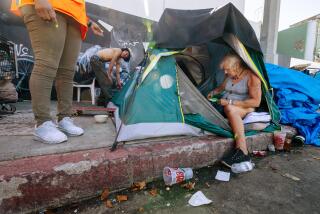Russia set to make Olympic history -- for spending, controversy
The costs and challenges confronting Russia as it tries to convert a Black Sea beach resort into a Winter Olympics venue recall the “hero projects” of the Soviet era, when deluded dictators squandered fortunes trying to reverse the flow of Siberian rivers and build major industrial cities on the frozen tundra.
A sprawl of scaffolding, excavation and road works that stretches 25 miles along the troubled eastern Black Sea shore, the transformation of Sochi is already the most expensive makeover in Olympic history, according to figures disclosed this week by Deputy Prime Minister Dmitry Kozak.
The projected $51-billion tab for the 2014 Olympic Winter Games is almost three times what the next most-expensive winter competition cost, the 1998 events in Nagano, Japan, that came in at $17.5 billion. Sochi 2014 will also eclipse Beijing’s $40-billion outlay six years ago, the most expensive Summer Olympics, which stage more events and require significantly more investment in facilities than the winter version.
Russia’s woes extend far beyond the budgetary. Reports of massive corruption in the awarding of construction contracts and mistreatment of migrant workers from Central Asia are undermining President Vladimir Putin’s attempts to project post-Soviet Russia as a stable and prosperous global power.
Putin visited the work-in-progress this week to kick off the one-year countdown to the Feb. 7 opening ceremonies. But rather than basking in the reflected glory of a massive undertaking well on track, he was forced to use the occasion to upbraid project stewards for waste, delays and inefficiencies that have pushed the preparations at least 400% over original cost projections.
Putin learned during his Wednesday tour that the ski jump platform was two years behind schedule and expected to cost $265 million, more than six times its budget. He ordered the contractor fired and launched into sarcastic derision, making clear his displeasure with the ground work for what will be Russia’s most high-profile appearance on the world stage in 34 years. The 1980 Olympic Summer Games were held in Moscow, but marred by a U.S.-led boycott of Western nations in protest of the Soviet Union’s occupation of Afghanistan.
Russia’s staging of the 2014 Games follows its hosting last year of the 21-nation summit of the Asia-Pacific Economic Cooperation forum in Vladivostok. Multiple Russian cities, including Sochi, also will be the sites of the 2018 World Cup soccer finals.
“They all fit into a pattern of the Putin government trying to drape itself in pageantry and be a major convener of international events,” said Andrew Weiss, director of the Rand Center for Russia and Eurasia and a former Russia expert at the National Security Council under President Clinton.
Hosting big-ticket gatherings boosts economic development around the venues and encourages attention to access for the disabled and “green” construction practices, Weiss noted of the new hotels, roads, airports and sports complexes sprouting across Sochi.
“But that to me is not a strong foundation to justify the enormous amount of resources and attention being focused on these big events,” Weiss said. He pointed to Russian antidrugs activist Yegor Bychkov’s recent blog arguing that Moscow could have built swimming pools, skating rinks and sports arenas in 1,100 cities for the money it is spending in Sochi.
Sergei Aleksashenko, macroeconomic research director at Moscow’s Higher School of Economics, agreed.
“Practice shows that Winter Olympics hardly ever pay off for the organizers, and you’ll never be able to make a $50-billion event pay off,” he told the RIA Novosti agency.
Human rights advocates have criticized the Kremlin for failing to embrace the values expected of a country hosting what is arguably the world’s most prestigious and inclusive event.
“In the last 15 months, there has been a continuing assault on basic rights,” said Michelle Ringuette, Amnesty International USA’s chief campaign officer. She referred to the jailing of political opponents like corruption fighter Alexei Navalny and the prosecution of the Pussy Riot punk rockers, two now serving time in remote hard-labor camps for singing a protest song at a Moscow cathedral.
Rachel Denber, deputy Europe and Central Asia director for Human Rights Watch, called the last year “singularly horrid in terms of human rights” in a commentary she wrote for CNN.
“It’s been a countdown not to something new and exciting, but to the grim Soviet past,” she said of the curbs on freedom of speech and assembly, tough new laws punishing libel and treason, the branding of international aid workers as “foreign agents” and a ban on Americans adopting Russian orphans.
Russian organizers of the Games, though, insist all will be in order. Organizing Committee Chairman Dmitry Chernyshenko, a former advertising executive, assured journalists touring the construction sites this week that the ambitious building plans were on track for timely completion and that the 120,000 expected visitors and athletes will find safe and comfortable conditions.
Security could prove one of the toughest challenges, as Sochi sits at the vortex of ethnic, religious and political disputes roiling the Caucasus region.
“Heavy-handed security procedures are something the Russians do well,” Weiss said. “But, still, you don’t want ski runs where half the people on the slopes are carrying weapons.”
ALSO:
Girl shot by Taliban is discharged from hospital in Britain
Gunmen kill polio immunization workers in northern Nigeria
Suicide bombing in northern Mali may signal shift by militants
A foreign correspondent for 25 years, Carol J. Williams traveled to and reported from more than 80 countries in Europe, Asia, the Middle East and Latin America.
More to Read
Sign up for Essential California
The most important California stories and recommendations in your inbox every morning.
You may occasionally receive promotional content from the Los Angeles Times.











